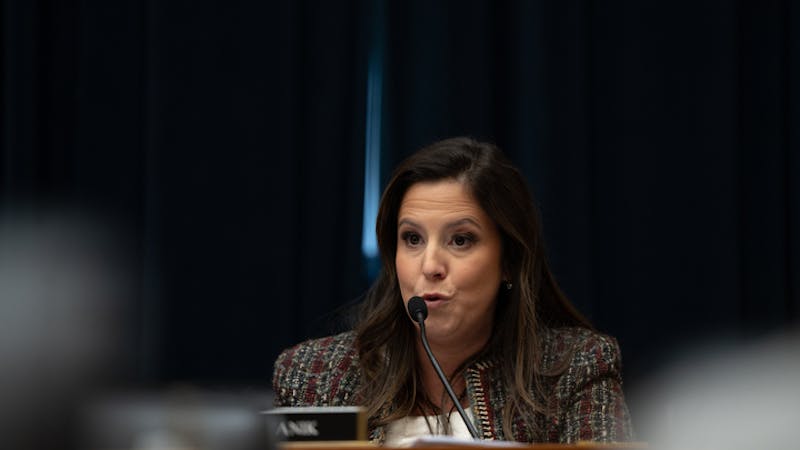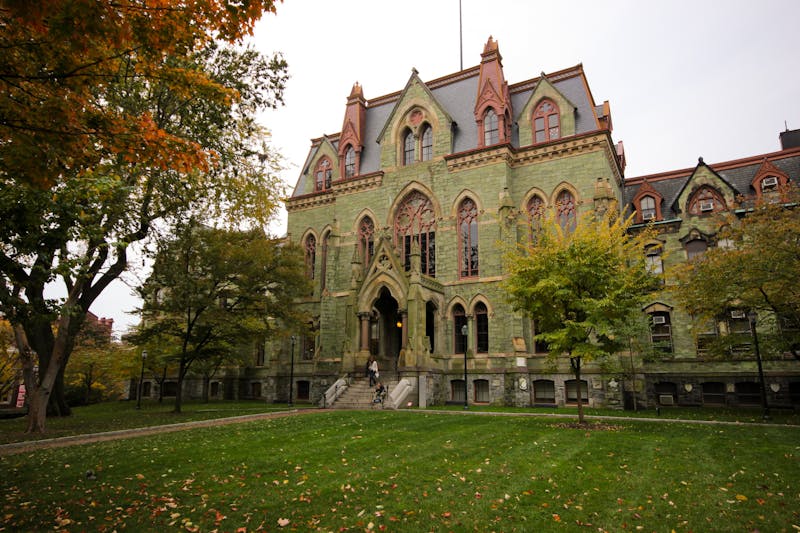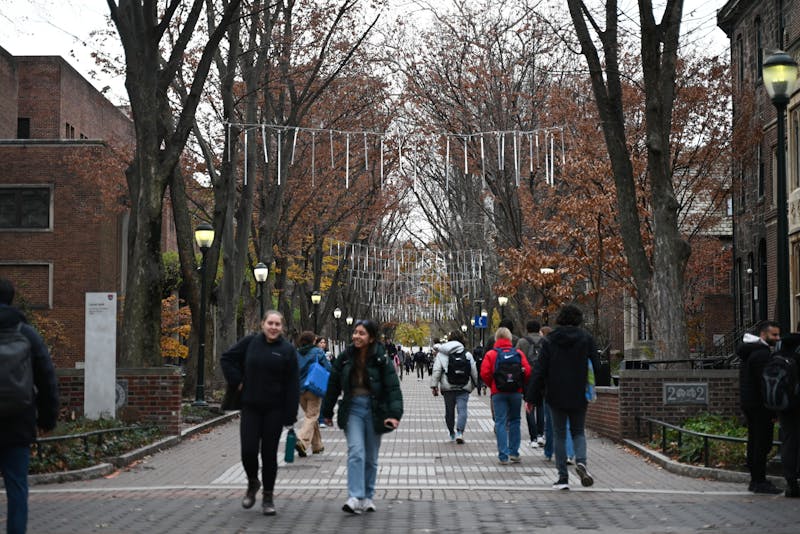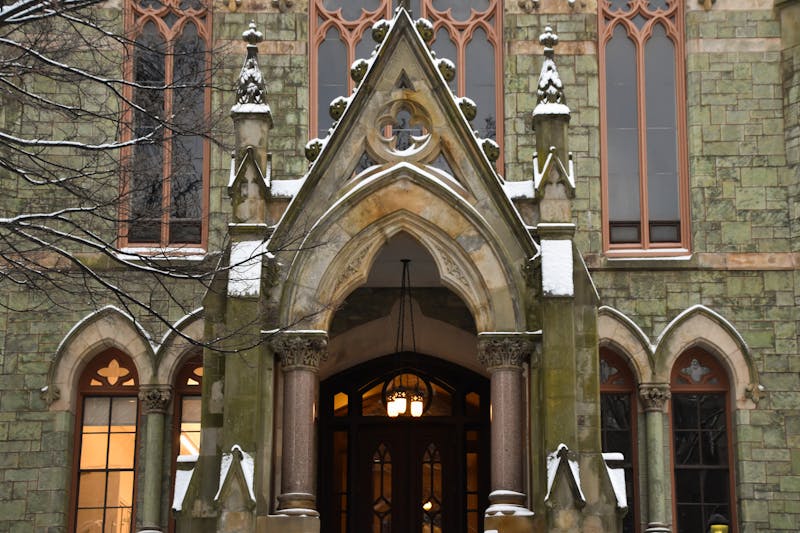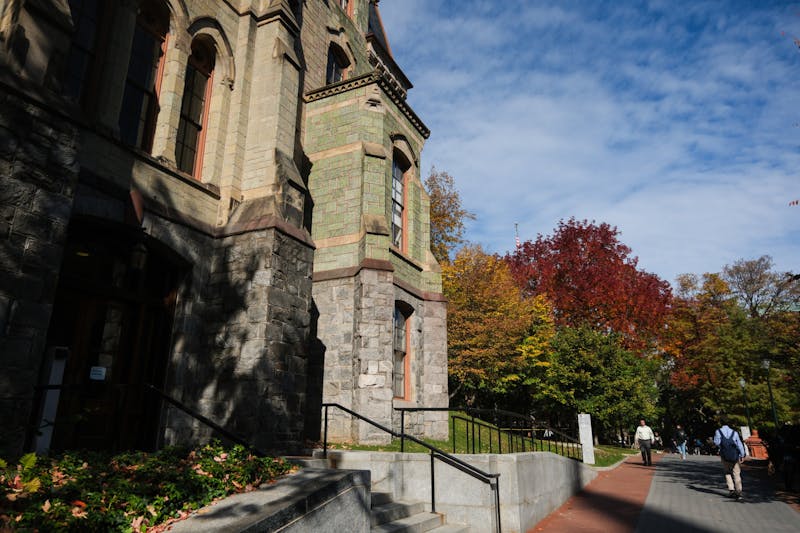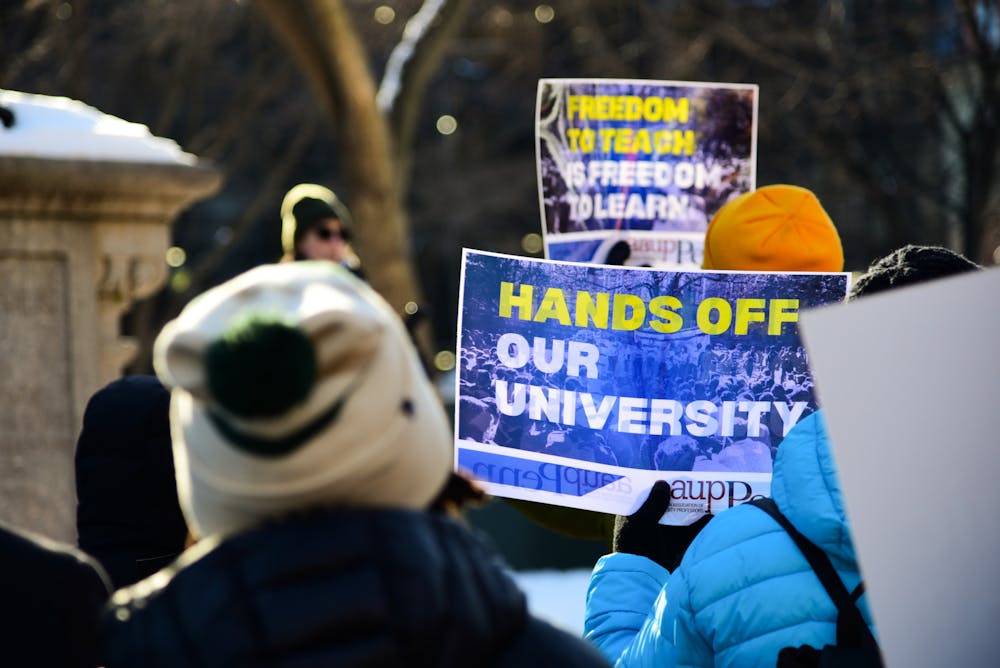
Penn faculty and other community members gathered on Monday afternoon in front of College Hall for a demonstration in support of academic freedom.
The demonstration, which was organized by the Penn chapter of the American Association of University Professors — a faculty advocacy group — included student and faculty speakers from various Penn schools. Around 100 university affiliates were present.
The rally opened with remarks from Amy Offner, an associate professor of history and president of AAUP Penn. Her speech criticized the involvement of donors and members of the Penn board of trustees in recent University affairs, including September’s Palestine Writes Literature Festival.
“Universities don’t exist to serve private interests," Offner said. "They are not tools for the business interests or political agendas of donors and trustees."
A Penn spokesperson referred The Daily Pennsylvanian to Interim President J. Larry Jameson's Q&A with Penn Today, where Jameson discussed importance of both academic freedom and the value of open expression. He added that the values of academic freedom and free speech are “fundamental” for “discovery, creativity, civil debate, and the emergence of new ideas.”
David Kazanjian, a professor of English and member of the AAUP Penn Executive Committee said that a goal of the rally was to “reassert” the principles of academic freedom and faculty governance on campus.
“We were concerned that people outside the university with no formal role in determining academic affairs at the University were trying to influence those affairs,” Kazanjian sais.
Moving forward, AAUP hopes to help ensure that those who have felt harassed or intimidated feel “comfortable and confident again” when it comes to what they are teaching. AAUP membership has increased by a third this semester, according to Kazanjian.
“We are encouraging more and more people to come,” Kazanjian added. “We’re having extensive conversations with people all across every corner of university, to bring them on board, so that we learn.”
Multiple speakers, including Offner, also referred to a letter sent by Wharton Board of Advisors Chair Marc Rowan titled "Moving Forward," which was sent to The Board of Trustees on Dec. 12.
In the letter, Rowan called upon trustees to be transparent on the path forward for the University. He also asked a series of questions, including whether the process and policies regarding granting faculty status should be revisited. He also requested that Penn's policies on free speech, civil discourse, and hate speech be defined.
Regarding the questions that Rowan sent to the trustees, a spokesperson for Rowan told The Daily Pennsylvanian: “Marc is saying these are the questions, he’s not trying to provide answers. In no way is it what Marc wants. Ultimately, it is what the trustees and faculty want.”
Speakers at the event discussed the importance of protecting freedom of inquiry, discourse, teaching, research, and publication as essential to the University.
One speaker quoted the Penn Faculty Handbook's Academic Freedom and Responsibility section, which outlines the University's policy to "maintain and encourage" academic freedom in all capacities and protects academic staff from "influences within or without the University."
“It's there written out so it shouldn't be controversial,” he said.
Siarhei Biareishyk, a senior lecturer of Russian and East European Studies, also reaffirmed the universal importance of academic freedom.
"Academic freedom is not an individual privilege. It is a collective right of our profession," she said.
Jack Starobin, a College senior and member of progressive Jewish group Penn Chavurah, also spoke at the rally. He advocated for open expression at the school, particularly in the context of the Israel-Hamas war.
“That includes the right for my peers and I to speak out against Israeli apartheid and charge genocide in Gaza,” he said.
Starobin addressed controversy around the “Israelism” film screening hosted by Penn Chavurah in Meyerson Hall on Nov. 28. Nearly 100 community members attended the screening, despite several University attempts to postpone the event.
“If a film screening is off limits, what else are we not allowed to talk about?” he said in reference to the event.
Starobin ended his speech with a question for the audience, which was prefaced by discussion of recent political focus by Congressional Republicans into Penn.
“Then they lobby our universities to crack down on academic freedom. Is Penn going to cave to that pressure? Or are we going to set a better example?" he asked.
In her speech, Offner spoke about “organized” efforts by “billionaires, lobbying organizations, and politicians who would like to control what can be studied and taught in the U.S.”
“This is an anti democratic attack unfolding not just at Penn, but all across the country,” she continued. “It is an attack on the very mission of higher education to produce new knowledge for the public good. We cannot and we will not allow it to succeed,” Offner said.
AAUP-Penn has released multiple statements this semester in response to events on campus, particularly as a result of the conflict in the Middle East.
In an “urgent message” released on Nov. 28, AAUP-Penn’s executive committee expressed concern about alleged violations of academic freedom by University administration regarding Penn’s decision to refuse to allow Penn Chavurah, a progressive Jewish student group, to host a film screening of “Israelism.”
The Daily Pennsylvanian is an independent, student-run newspaper. Please consider making a donation to support the coverage that shapes the University. Your generosity ensures a future of strong journalism at Penn.
Donate







